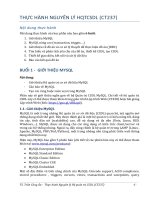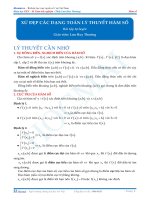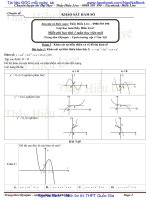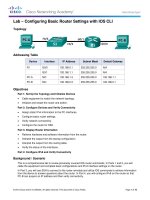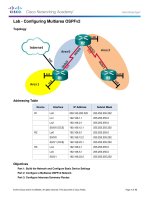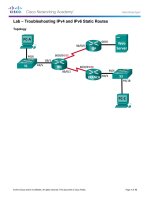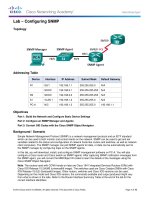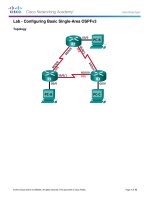key flashlight kho tài liệu bách khoa
Bạn đang xem bản rút gọn của tài liệu. Xem và tải ngay bản đầy đủ của tài liệu tại đây (411.15 KB, 12 trang )
Activity 3
Product Design: The Key Chain Flashlight
Design Brief
This is your starting point for the project. The design brief will tell you what you need to do and what the successful product (design
solution) will be like.
Design and model a producible (can actually be made) flashlight that can be used as a key-chain. It must incorporate one “ultra-bright” white LED and one
AAA battery or coin battery. The flashlight must have a push-switch that completes the circuit as long as the switch is pressed. You will need to devise some
means of holding both the LED and battery in position and design the switch.
Identify Stakeholders
Identify the major stakeholders in the design and briefly explain
what would satisfy each one. Some of these are started for you.
Stakeholder Name
1: Consumer
What this person looks for in a successful design
Low cost, easy to use, fits well on key chain (others…)
2: Manufacturer
Low cost to produce, consumer demand for product, profitability (others…)
3: Society
Will not pollute environment (others…)
4: Retailer
Project: Key-Chain Flashlight
Name:
Course:
page 139
Activity 3
Investigation & Research
In this step you should try to find the answers to questions that will help you in your design work.
Questions that deal with the size and shape of standard parts that will be used in your design need to be asked. In this case you will use an LED and a
battery. You should find specifications for these parts, or better yet, find the actual parts and measure them yourself. Now you have a starting point.
Whatever you come up with in the way of a product must hold a battery. These are some questions you need to ask. What are some others?
1.
What is the size and shape of the battery that will be used in the flashlight?
To answer this question you should measure actual batteries and sketch the dimensions below.
Sketch a AAA battery with accurate
overall length and diameter
Project: Key-Chain Flashlight
Name:
Sketch a coin battery with accurate
thickness and diameter
Course:
page 140
Activity 3
Investigation & Research - continued
2. What is an LED and what do I need to know about it to use it in my design?
A An LED is a Light Emitting Diode, an electronic device that can give off plenty of light but use very little current. It is important that it uses little current
because a battery will last a long time when operating devices that have a small current “draw,” therefore, a battery will not require changing very often.
In fact some small flashlights that use LEDs do not have any way to change the battery. The flashlight is thrown away when it’s useful life is over. Also,
you should know that an LED will only work if the battery is connected to it in a certain way. A battery has a positive and a negative terminal and an LED
has a positive and a negative terminal. The positive of the battery must be connected to the positive of the LED, and negative terminals must be
connected together.
3. What reasons can you give for buying a product that is designed to be thrown away when its useful life is over?
Project: Key-Chain Flashlight
Name:
Course:
page 141
Activity 3
Investigation & Research - continued
4. What reasons can you give for buying a product that is designed so that it can be
maintained by replacing the battery?
5. What other design considerations should I think about before beginning the design of
the product (safety, materials, durability, practicality, producibility, environmental
impacts, etc.)
Sketch an LED with accurate overall
length and diameter and location of
leads
Project: Key-Chain Flashlight
Name:
Course:
page 142
Activity 3
Investigation & Research - continued
6. What can I learn from existing flashlights about how these products are made and designed?
You should look at a number of small flashlights and, if possible, take them apart and look inside. For example, you would learn that larger flashlights are
often designed so that cylinder-shaped batteries can be loaded in the front or back. Flashlights of different shapes, or those that use smaller “coin” batteries
use a different approach to loading a battery.
What else can you learn that would help in the design of your product? Use this space to sketch some of the flashlights you examine, including some of the
details about how they are constructed, what kind of textures are used to prevent the product slipping out of your hand, what materials they are made of,
etc. Use annotations on your drawings to point out some of these details.
Project: Key-Chain Flashlight
Name:
Course:
page 143
Activity 3
Investigation & Research – continued
Either use standard Pro/DESKTOP battery and LED files your teacher has given you or develop your own files for these components. The
components should be the same size as the ones you intend to use for your design. You will need these parts for your final assembly.
Paste Pro/DESKTOP renderings of these parts on this page.
Project: Key-Chain Flashlight
Name:
Course:
page 144
Activity 3
Initial Design Ideas
Sketch at least eight initial ideas for your flashlight design on this page. Remember, the more ideas you have the better the chance that one of
them will be a good one.
You should keep in mind the size and shape of the LED and the battery you have chosen. Consider where the switch will be located but don’t
worry about how it will work yet.
You may want to try out designs based on cylinders, flat shapes, geometric or organic shapes.
Project: Key-Chain Flashlight
Name:
Course:
page 145
Activity 3
Refine Your Design Idea
Select one of the designs on the previous page and explain why you have chosen that design. You might want to use terms that describe how it
looks, how it might feel to hold that flashlight design, how handy it would be to use, etc.
On this page you will also refine your idea. Using the design you have chosen, experiment (by sketching variations) with changing proportions
until you come up with the best proportions you can. You might want to start with the proportions of the “Golden Rectangle.” If you do not
know what a Golden Rectangle is, you might want to do a quick Internet search for some clues.
Project: Key-Chain Flashlight
Name:
Course:
page 146
Activity 3
Refine Your Design Idea – continued
Now you will need to figure out how the flashlight will hold the battery and LED. You already know the sizes of these parts, so use them to
adjust the size and shape of your flashlight. It might be a good idea to disassemble a small flashlight (if available) to see how someone else
solved this problem.
The LED doesn’t need a cover over it, so plan on making the top stick out of the flashlight. You wouldn’t want the LED to disappear inside if
someone pushed on it, so it will need to have a way to keep it from sliding in or out.
You might want to think in terms of a two-piece case for your design. This would allow the flashlight to be assembled easily by placing the
battery and LED in between small “tabs” that would keep everything in its place. Remember to develop a way to fasten the two parts of the
case together, such as screws or places that glue would be used to make a strong connection.
Project: Key-Chain Flashlight
Name:
Course:
page 147
Activity 3
Finalize Your Design
On this page sketch out the final design you have developed, including any dimensions you want to remember, such as cavities to fit the battery. Your sketch
can be rough because the Pro/DESKTOP program helps you to present your ideas as high quality renderings. You will refer to this page while designing in
Pro/DESKTOP.
Project: Key-Chain Flashlight
Name:
Course:
page 148
Activity 3
Present Your Design
On this page paste the printouts of the final Pro/DESKTOP design, including isometric or trimetric, top, side, and front views of the 3D design. You may also
want to present orthographic views from the Drawing part of Pro/DESKTOP to show how interior parts are made.
Project: Key-Chain Flashlight
Name:
Course:
page 149
Activity 3
Evaluate Your Design
Write an evaluation of your design. You should briefly discuss the strengths of your design and its weaknesses. You should address things like: how it looks,
how well it works as a key-chain, how well the battery and LED fit in the design and any other factors that are important for a successful key-chain
flashlight design. Make sure you refer to the Stakeholders you identified in the beginning of the project.
Strengths of the Design
Weaknesses of the Design
Project: Key-Chain Flashlight
Name:
Course:
page 150
